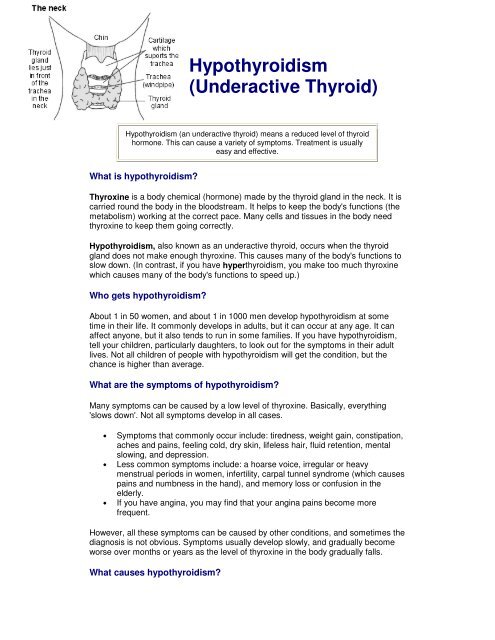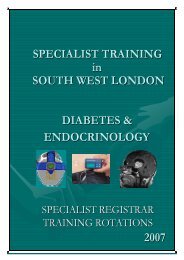Hypothyroidism (Underactive Thyroid)
Hypothyroidism (Underactive Thyroid)
Hypothyroidism (Underactive Thyroid)
You also want an ePaper? Increase the reach of your titles
YUMPU automatically turns print PDFs into web optimized ePapers that Google loves.
<strong>Hypothyroidism</strong><br />
(<strong>Underactive</strong> <strong>Thyroid</strong>)<br />
<strong>Hypothyroidism</strong> (an underactive thyroid) means a reduced level of thyroid<br />
hormone. This can cause a variety of symptoms. Treatment is usually<br />
easy and effective.<br />
What is hypothyroidism?<br />
Thyroxine is a body chemical (hormone) made by the thyroid gland in the neck. It is<br />
carried round the body in the bloodstream. It helps to keep the body's functions (the<br />
metabolism) working at the correct pace. Many cells and tissues in the body need<br />
thyroxine to keep them going correctly.<br />
<strong>Hypothyroidism</strong>, also known as an underactive thyroid, occurs when the thyroid<br />
gland does not make enough thyroxine. This causes many of the body's functions to<br />
slow down. (In contrast, if you have hyperthyroidism, you make too much thyroxine<br />
which causes many of the body's functions to speed up.)<br />
Who gets hypothyroidism?<br />
About 1 in 50 women, and about 1 in 1000 men develop hypothyroidism at some<br />
time in their life. It commonly develops in adults, but it can occur at any age. It can<br />
affect anyone, but it also tends to run in some families. If you have hypothyroidism,<br />
tell your children, particularly daughters, to look out for the symptoms in their adult<br />
lives. Not all children of people with hypothyroidism will get the condition, but the<br />
chance is higher than average.<br />
What are the symptoms of hypothyroidism?<br />
Many symptoms can be caused by a low level of thyroxine. Basically, everything<br />
'slows down'. Not all symptoms develop in all cases.<br />
• Symptoms that commonly occur include: tiredness, weight gain, constipation,<br />
aches and pains, feeling cold, dry skin, lifeless hair, fluid retention, mental<br />
slowing, and depression.<br />
• Less common symptoms include: a hoarse voice, irregular or heavy<br />
menstrual periods in women, infertility, carpal tunnel syndrome (which causes<br />
pains and numbness in the hand), and memory loss or confusion in the<br />
elderly.<br />
• If you have angina, you may find that your angina pains become more<br />
frequent.<br />
However, all these symptoms can be caused by other conditions, and sometimes the<br />
diagnosis is not obvious. Symptoms usually develop slowly, and gradually become<br />
worse over months or years as the level of thyroxine in the body gradually falls.<br />
What causes hypothyroidism?
The common cause is due to an 'autoimmune disease'. The immune system<br />
normally makes antibodies to attack bacteria, viruses, and other 'bugs'. In people<br />
with autoimmune diseases, the immune system makes antibodies against part(s) of<br />
the body. Most people with hypothyroidism make antibodies which attack their own<br />
thyroid gland. The thyroid gland is then not able to make enough thyroxine, and<br />
hypothyroidism gradually develops. It is thought that something triggers the immune<br />
system to make antibodies against the thyroid. The 'trigger' is not known.<br />
Other causes are uncommon. For example:<br />
• rare hormone or gland problems which affect the thyroid gland.<br />
• a side effect to some medicines. (For example, amiodarone and lithium).<br />
• surgery or radioactive treatment to the thyroid gland for other conditions.<br />
• some children are born with an underactive thyroid gland (congenital<br />
hypothyroidism).<br />
How is hypothyroidism diagnosed?<br />
A blood test can diagnose hypothyroidism. A normal blood test will also rule it out if<br />
symptoms suggest that it may be a possible diagnosis.<br />
The common blood test measures a hormone called thyroid-stimulating hormone<br />
(TSH). This hormone is made in the pituitary gland in the brain and is released into<br />
the bloodstream. It stimulates the thyroid gland to make thyroxine. If the level of<br />
thyroxine in the blood is low, then the pituitary releases more TSH to try and<br />
stimulate the thyroid gland even more. Therefore, a raised level of TSH means the<br />
thyroid gland is underactive and is not making enough thyroxine.<br />
How is hypothyroidism treated?<br />
The usual treatment is to take thyroxine tablets each day. This replaces the thyroxine<br />
which your thyroid gland is not making. Most people feel much better quite quickly<br />
after starting treatment.<br />
(The treatment above is for the common cause of hypothyroidism. Some rare causes<br />
of hypothyroidism may need additional treatments.)<br />
What is the correct dose of thyroxine?<br />
Most adults need between 50 and 200 mcg daily. A low dose is prescribed at first<br />
and is gradually increased over a period of time. Blood tests are usually taken every<br />
now and then over several months, and the dose may be adjusted accordingly. The<br />
blood test measures TSH (see above). Once the blood TSH level is normal it means<br />
you are getting the correct amount of thyroxine from the tablets. It is then common<br />
practice to check the TSH blood level once a year.<br />
As you get into your 70s and 80s, you may need a reduced dose of thyroxine. Also, if<br />
your weight changes by more than 1 stone (about 7 kg) due to dieting, weight gain,<br />
or pregnancy, you should have a blood test sooner than the routine annual test as<br />
the dose may need to be adjusted.<br />
Missed a tablet?
Everyone forgets to take their tablets from time to time. Don't worry as the odd<br />
forgotten thyroxine tablet will not make much difference. However, you should try to<br />
take thyroxine regularly for maximum benefit. Symptoms will gradually come back if<br />
you do not take the tablets for several days or more.<br />
How long is the treatment for?<br />
For most people, treatment is for life. Occasionally the disease process reverses.<br />
This is rare apart from in the following situations.<br />
Children. Sometimes hypothyroidism is a temporary condition in older children. This<br />
is not so for children who are born with an underactive thyroid.<br />
Pregnancy. About 1 in 20 women have thyroid imbalance for up to one year after<br />
having a baby. Often this corrects itself. However, afterwards it is wise to have a<br />
yearly blood test as there is an increased chance of developing long-term<br />
hypothyroidism in the future.<br />
Are there any side-effects from treatment?<br />
Usually not. Thyroxine tablets replace the body's natural hormone, so side-effects<br />
are uncommon. However, if you have angina, you may find that your angina pains<br />
become worse when you first start thyroxine. Tell a doctor if this happens.<br />
If you take too much thyroxine it can lead to symptoms of an over-active thyroid, such<br />
as palpitations, diarrhoea, irritability, or flushing. This is why the initial treatment dose<br />
is small and gradually built up, and why you need blood tests to check that you are<br />
taking the correct dose of thyroxine.<br />
Free prescriptions<br />
If you have hypothyroidism, you are entitled to free prescriptions. This is for all your<br />
medicines, whether related to the hypothyroidism or not. Ask your pharmacist for<br />
details and for a form to fill in to claim this benefit.<br />
In summary<br />
• <strong>Hypothyroidism</strong> is common.<br />
• Symptoms develop gradually. They may be confused with other conditions.<br />
• Treatment with thyroxine tablets is usually easy and effective.<br />
• Treatment is usually for life.<br />
• Have a blood test once a year if you take thyroxine tablets.<br />
Further help and advice<br />
British <strong>Thyroid</strong> Foundation: PO Box 97, Clifford, Wetherby, West Yorkshire, LS23<br />
6XD<br />
Tel: 0870 7707933 Web: www.btf-thyroid.org



